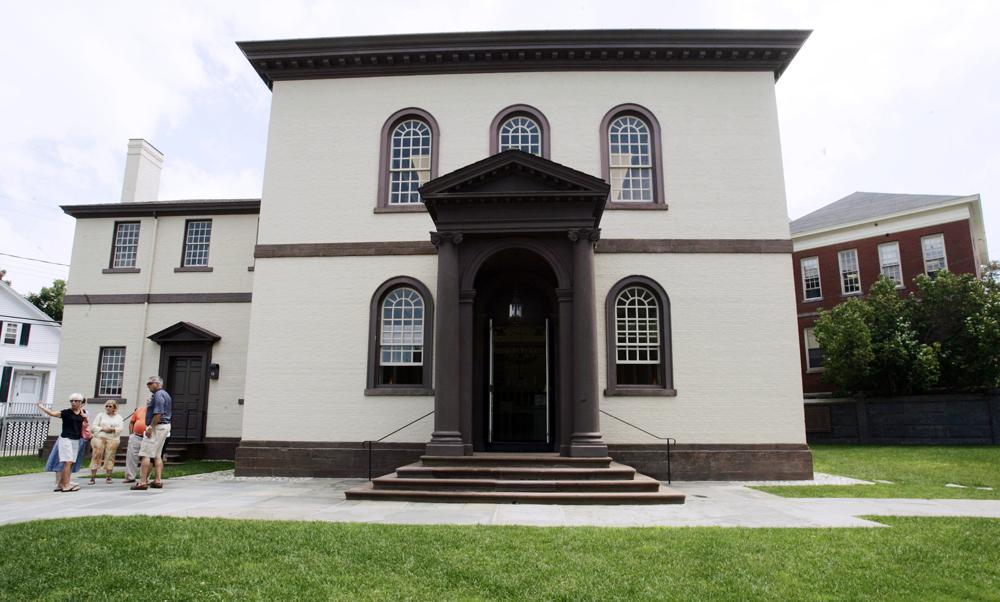The Rhode Island mispalelim who daven at the nation’s oldest shul won’t be evicted, as a judge ruled in their favor Monday. But the yearslong legal dispute over the historic building and a set of ceremonial bells worth millions appears far from over.
Newport-based Congregation Yeshuas Yisroel is the current tenant at the 250-year-old Touro Synagogue. It’s owned by New York-based Congregation Shearith Israel, which filed a motion in state Superior Court in February to take control of the board that oversees day-to-day operations.
The Rhode Island congregation took the filing as an effort to evict them from the building, something that the New York congregation denied
Judge Colleen Hastings in Newport District Court on Monday dismissed Congregation Shearith Israel’s effort to take control of the board.
Louis Solomon, president of Congregation Shearith Israel, said in an email that the motion was dismissed on a technicality — and the legal case will proceed.
“Shearith Israel is committed to regime change of the corporate lessee of Touro Synagogue,” Solomon said, adding that the congregation “is fully committed to pursuing all legal efforts to change control over the Board.”
Louise Teitz, co-president of the Newport congregation, called the eviction attempt “meritless.”
“We hope that our New York landlord will now choose to finalize the terms for a longterm lease for Jeshuat Israel that will provide certainty and stability for our congregation going forward,” she said in a statement.
Touro Synagogue was consecrated in 1763, but the Jewish community that founded it eventually dispersed and Congregation Shearith Israel became trustees.
The current congregation has been worshipping at the site since 1883 and leases it for $1 a year, per a 1903 agreement.
The dispute began in 2011 when the Newport congregation moved to sell a set of ritual bells to the Museum of Fine Arts in Boston for $7.4 million. Congregation Shearith Israel sued, citing the trustees agreement.
A trial judge initially awarded control of the property and the bells to the Newport congregation, but in 2017 the 1st U.S. Circuit Court of Appeals reversed that decision. The U.S. Supreme Court in 2019 declined to intervene in the case.
Touro Synagogue holds an important place in the history of the nation’s commitment to religious freedom. In 1790, George Washington visited Touro, and sent a letter to the congregation pledging America’s commitment to religious liberty, writing that the young nation “gives to bigotry no sanction, to persecution no assistance.”
(AP/YWN)












8 Responses
If Louis Solomon and his Congregation Shearith Israel are being so brazen to go to secular court in absolute violation of Torah & Jewish law, how dare he waste his time commencing saying סליחות today אלול.
Just call it a day and discontinue סליחות וראש-השנה ויום-הכיפורים if you Louis Solomon are being so brazen to lift your hand against G-d by going to secular court
There is no reason for this to be in court.
This should have been in Beis Din all along.
I don’t know know what Beis Din would go along with selling the Rimonim to the museum of fine arts in Boston.
I agree with above comment.
never been my kind of jew so not going to make a comment…..
Unfortunately from personal experience Bais Din should ideally be the place to go but members of the Bais Din change over time and are not always best suited for that position. In my case many alternatives were chosen according to the Bais Din’s regulations. The defendant waited almost two months (with the Head of the Bais Din’s permission) until his original preference was in better health to sit on the Bais Din. That was regardless of the several alternatives chosen. Also, I see in many rulings among noted Chachamim that Jews may turn to a civil court and not Bais Din.
I am just glad i have a shul i can put on my tefillin each day.
please stop the bickering
Rena
Disgraceful Chillul ‘H.
Kamza bar kamza 2022.
Someone named Rina is putting on tefillin there every day and you call this a shul?